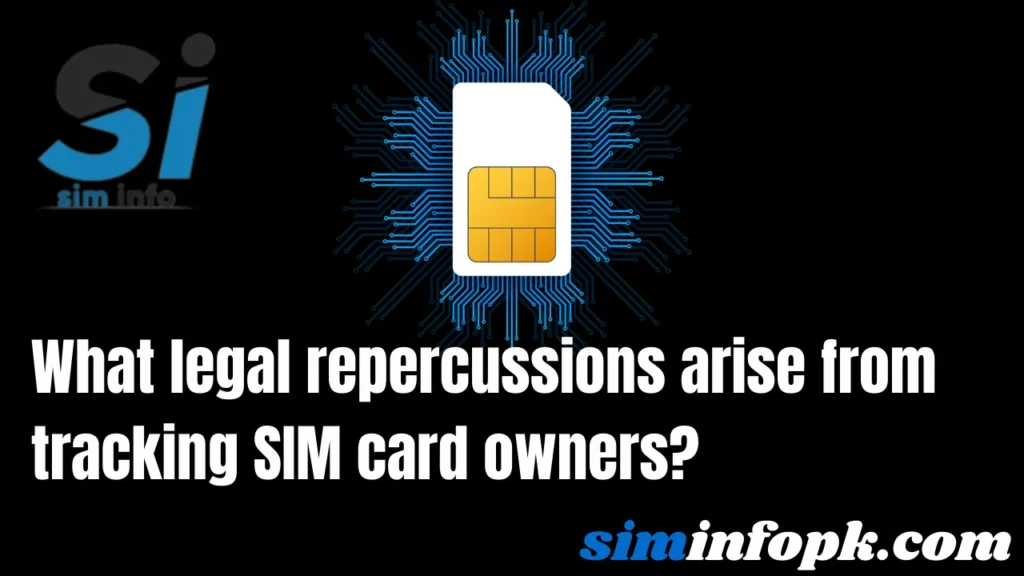What legal repercussions arise from tracking SIM card owners?
In an increasingly interconnected world, tracking SIM card owners has raised profound legal questions and stirred debates surrounding privacy, surveillance, and individual rights. Understanding the legal ramifications of such tracking is paramount as it intersects with various laws, regulatory frameworks, and international agreements.

Legal repercussions arise from tracking SIM card owners.
Tracking SIM card owners can lead to significant legal repercussions. It intersects with privacy laws, raising concerns about unauthorized surveillance and data collection. Law enforcement agencies must adhere to strict legal procedures, including obtaining warrants based on probable cause and respecting individuals’ rights.
Violations of these legal standards can result in legal challenges, including lawsuits and penalties. Therefore, it’s essential to ensure that tracking activities comply with established legal frameworks to avoid legal consequences.
Which laws oversee the tracking of SIM card owners?
The tracking of SIM card owners falls within the purview of numerous legal provisions and regulatory measures. National laws, often governed by legal jurisdictions, dictate the permissible scope and procedures for such tracking activities.
Regulatory bodies, empowered by these laws, enforce compliance and ensure that tracking practices adhere to established legal frameworks. Law enforcement agencies, guided by these laws, play a pivotal role in executing and overseeing SIM card tracking within the boundaries of legal authority.
How does the tracking of SIM card owners affect privacy rights?
The tracking of SIM card owners directly impacts privacy rights, raising concerns about unauthorized surveillance and data collection. Privacy laws, designed to safeguard individuals’ personal information, are invoked to regulate and mitigate potential infringements resulting from tracking activities.
Data protection measures aim to govern the handling and storage of sensitive information obtained through SIM card tracking. Surveillance practices, subjected to scrutiny under these laws, must align with principles of transparency, proportionality, and consent requirements to uphold individuals’ privacy rights.
Under what conditions are law enforcement agencies authorized to track SIM card owners?
Law enforcement agencies are authorized to track SIM card owners under specific conditions delineated by legal procedures and judicial oversight. Warrants, issued based on probable cause and supported by evidence, serve as legal instruments granting authorization for tracking activities.
Due process ensures that tracking operations adhere to procedural fairness and respect fundamental rights. Judicial oversight acts as a check on the exercise of investigative powers, ensuring accountability and preventing abuses. In emergencies, where imminent threats to public safety exist, law enforcement agencies may invoke exceptional measures to track SIM card owners, provided they meet legal standards and procedural requirements.
Which international laws govern cross-border SIM card tracking?
Cross-border SIM card tracking implicates a complex interplay of international laws, jurisdictional conflicts, and bilateral agreements. International laws and treaties govern the extraterritorial jurisdiction of tracking activities, regulating cross-border data flows, and ensuring mutual legal assistance among nations.
Jurisdictional conflicts arise when tracking activities transcend national boundaries, necessitating coordination and cooperation between countries. Bilateral agreements facilitate data sharing and cooperation in cross-border investigations, enabling law enforcement agencies to track SIM card owners across international borders while adhering to legal principles and diplomatic protocols.
What legal precedents are available concerning cases of SIM card tracking?
Legal precedents offer valuable insights into the interpretation and application of laws in cases involving SIM card tracking. Court rulings, shaped by judicial interpretations and legal doctrines, establish precedent-setting decisions that guide future legal proceedings.
Analyzing past cases provides clarity on the legal standards, principles, and precedents relevant to SIM card tracking. Case law analysis illuminates the evolving legal landscape surrounding tracking practices, highlighting key considerations and implications for stakeholders.
How can individuals advocate for their rights regarding SIM card tracking?
Individuals can advocate for their rights regarding SIM card tracking through various avenues, including advocacy, activism, and legal representation. Awareness campaigns raise public consciousness about the implications of tracking activities on privacy and individual rights.
Litigation strategies enable individuals to challenge unlawful tracking practices and seek legal remedies for privacy infringements. Privacy advocacy groups offer support and resources to empower individuals in navigating legal challenges and promoting accountability in tracking initiatives. By engaging in advocacy efforts, individuals can amplify their voices and contribute to shaping policies that uphold privacy rights in the digital age.
Conclusion
In conclusion, the tracking of SIM card owners evokes a complex array of legal considerations, spanning national, international, and individual rights frameworks. Understanding the legal repercussions and navigating the regulatory landscape is essential for stakeholders involved in tracking activities. By upholding legal standards, respecting privacy rights, and promoting accountability, we can strike a balance between security imperatives and individual freedoms in an increasingly interconnected world.
